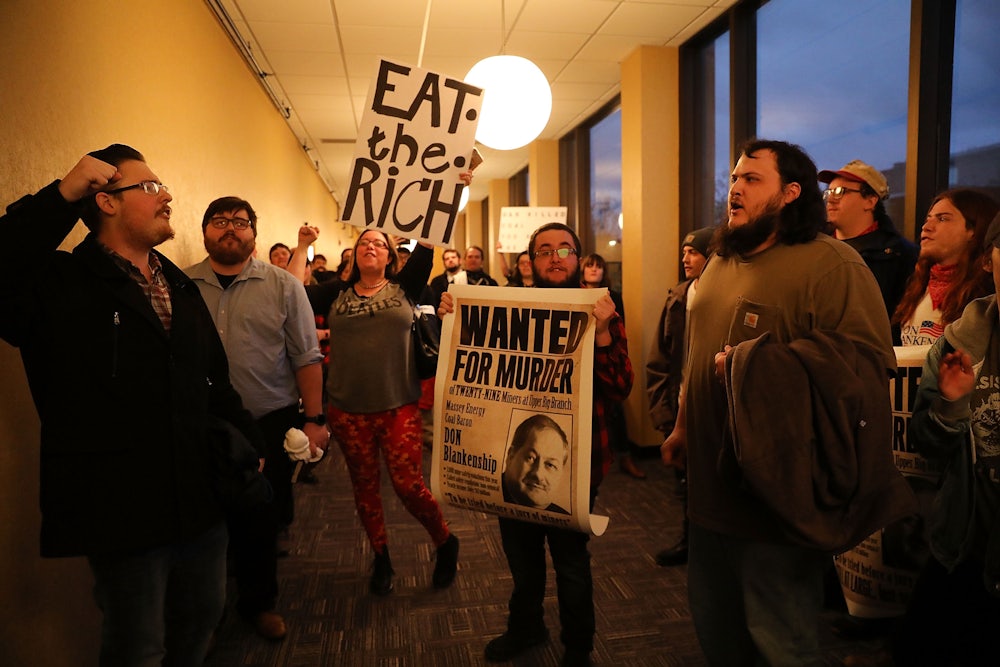Breathe in relief. Don Blankenship will not be West Virginia’s Republican nominee for Senate. For once, obscene wealth could not transcend the weight of a man’s earthly sins. “Cocaine” Mitch McConnell, racial slurs, 29 dead coal miners, Donald Trump’s opposition—each poked a hole in the mighty Blankenship. “Don’t worry about me,” he told supporters on Tuesday night, after it became clear that he would not win the primary. Indeed, why should anyone? He’s off to Paris, he says, and he has other reasons to celebrate. Blankenship, whose negligence as the CEO of Massey Energy directly caused the deaths of 29 miners in 2010, is a free man. His probation, which followed a year in prison for his role in the miners’ deaths, ended at midnight.
West Virginia is free, too, from the spectre of Senator Blankenship. At least for now. Blankenship ended Tuesday night a solid third in the state’s Republican primary. That showing is much worse than his campaign’s internal polling reportedly predicted, though it’s impossible to know if he ever told the truth about those polls. This is a man who still insists that the federal government set him up to take the fall for the explosion at Massey’s Upper Big Branch Mine, which needless to say raises questions about his credibility.
Blankenship’s defeat was a win for establishment Republicans, who feared that he would doom the party to failure in November. But there were other indications on primary night that West Virginia’s politics, which have been tilting Republican in recent years, are still in flux, thanks to some unexpected performances on the left.
Blankenship lost last night’s primary to Patrick Morrisey, the state’s attorney general. Morrisey will now challenge incumbent Joe Manchin in the general, and, despite the state’s conservative culture, Morrisey’s no shoo-in. As Politico reported in May, Morrisey is a former D.C. lobbyist for major pharmaceutical companies, including drug wholesalers. His wife, Denise, was once a lobbyist for Cardinal Health.
As Eric Eyre reported for the West Virginia Gazette-Mail in 2017, Cardinal is a high-profile name in the state’s ongoing opioid crisis. “Between 2007 and 2012, Cardinal Health shipped 241 million doses of hydrocodone and oxycodone—two powerful and potentially lethal painkillers—to pharmacies and hospitals across West Virginia, according to federal Drug Enforcement Administration data,” Eyre wrote. Hours before Morrissey won his primary, Cardinal Health’s CEO appeared before a U.S. House subcommittee to apologize, sort of, for his company’s role in the crisis.
If Blankenship has West Virginian blood on his hands, then so does Cardinal Health. Tuesday’s election seems quintessentially West Virginian in this regard: Republican voters encountered two candidates with links to industries that have bled the state dry and racked up a body count.
Unfortunately for Morrisey, Manchin is a one-man political institution in the state, a former governor turned senator. He’s also perhaps the Democratic Party’s most conservative senator, voting with Trump the majority of the time. Nevertheless, polling indicates that the Manchin brand is beginning to lose its luster. A March Axios poll found that Manchin was one of the country’s most vulnerable incumbents, possible collateral damage in the state’s loving turn toward Trump’s GOP.
And while Manchin easily won his primary, he did show some weakness. His insurgent challenger, Paula Jean Swearengin, was not going to defeat him. The question wasn’t if she’d win, but how well she’d perform, and in the light of morning she has real reason for pride. She pulled 30 percent against a powerful incumbent whose war chest dwarfed hers. She did so as an unapologetically left-wing coal industry critic. She earned more votes than Morrissey, and a lot more votes than Blankenship. West Virginia, it seems, is more the state of Swearengin than it is the state of Blankenship.
This is due to the fact that West Virginian voters are mostly registered Democrats, a legacy of the state’s former status as a solid blue bastion. Tuesday’s Senate primary also turned out fewer Democrats than 2012’s primary, either because voters have switched registrations, or because neither candidate inspired quite as much enthusiasm. Swearengin could run for office again, maybe for the state legislature. That lower turnout, however, bodes ill for Manchin.
However, turnout did favor a left-wing candidate in another state primary. Richard Ojeda trounced his closest primary challenger in the race to become the Democratic nominee for the state’s 3rd Congressional District. The New York Times put him at 29,837 votes, and while that’s well below the 53,703 earned by Democrat Matt Detch in 2016, that’s because Detch ran unopposed. Overall, turnout increased in the district: 57,327 votes in 2018 compared to 53,703 in 2016.
Voters clearly responded to having more options in the 3rd—Ojeda had three challengers—but there may be something else at work. Ojeda, who is a sitting state senator, adopted an extremely public role as an advocate for striking teachers, who walked out of schools statewide last month. Teachers and their allies responded to his advocacy in kind: they made Ojeda t-shirts, they chanted his name in the capitol, and they likely helped ensure his Tuesday night victory. Ojeda faces a more difficult road from here, as his district is deeply conservative. But Tuesday’s turnout may be an early sign that he has some momentum going into the general.
There are other nascent signs of dissatisfaction with the Republican Party, at least at the state level. Three Republican state senators lost their primary bids on Tuesday night. It’s tempting to tie this back to the teachers’ strike, during which Republican legislators repeatedly attempted to block attempts to meet even some of the teachers’ demands.
It’s too early, still, to know if West Virginia will see a blue wave in November. Chances aren’t high that it will. But there are reasons for the West Virginian left to think they’ve knocked some dents into the state’s formidably conservative armor.
